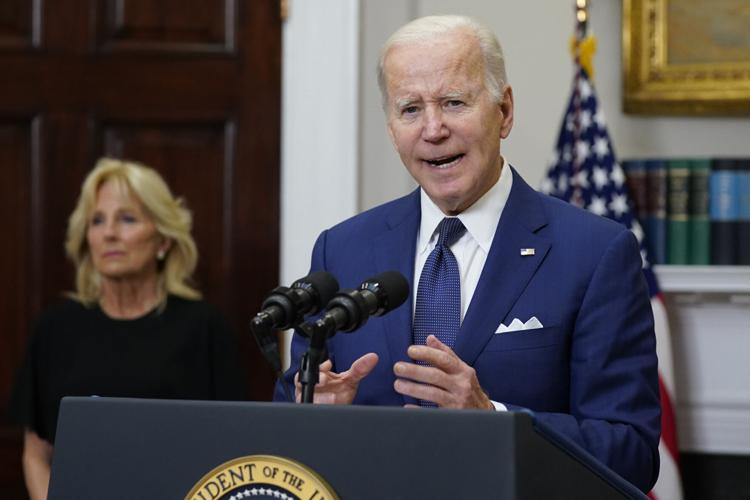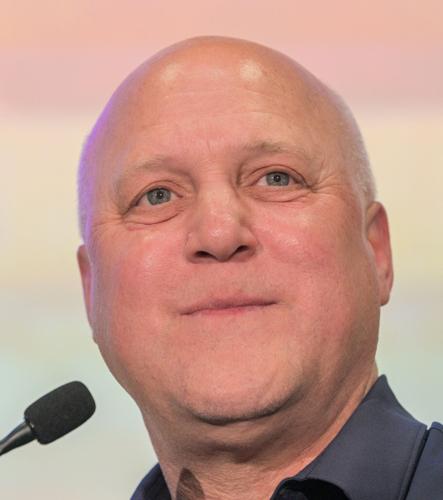A big question hanging over the Democratic Party is whether President Joe Biden runs again. Party operatives increasingly fear he can’t win.
A New York Times/Siena College poll backs that up: Only 26% of Democratic primary voters want Biden to be renominated, while 64% prefer someone else. Worse, he’s surprisingly weak among key party constituencies, such as Blacks, Hispanics, women and 18 to 29-year-olds.
Nevertheless, the 79-year-old Biden insists he’s running. He believes he can beat Donald Trump; the same poll shows him leading his predecessor by three points.
No sitting president has lost his party’s nomination since Franklin Pierce, 170 years ago. Ronald Reagan gave incumbent Gerald Ford a good run in 1976, but couldn’t quite pull it off. Ted Kennedy started strong against Jimmy Carter in 1980, but ultimately missed the mark.
Though incumbents rarely lose renomination, ten have lost reelection. And some have been scared out — abandoning bids for another term after reading, and tasting, bitter tea leaves.
An unpopular Harry Truman wanted another term in 1952, but bowed out after U.S. Sen. Estes Kefauver (D-Tenn.) defeated him in the New Hampshire primary. U.S. Sen. Eugene McCarthy (D-Minn.) opposed Lyndon Johnson in 1968 and came perilously close to beating him in the first primary. Shortly thereafter, U.S. Sen. Robert Kennedy (D-N.Y.) jumped into the race and LBJ announced he wasn’t running.
If Democrats lose seats in the midterm elections, as most expect, it could convince Biden to forego a reelection bid. But what if he doesn’t? Will party bigwigs — Barack Obama, Bill Clinton, Chuck Schumer, Jim Clyburn, John Kerry — go to the White House and tell him it’s over? Will other candidates try to nudge him out in the primaries? That’s yet to play out.
If Biden doesn’t run, who would Democrats pick?
There is, of course, Kamala Harris. But her last performance as a presidential candidate left much to be desired. While a sitting vice president would normally be in a good place to move up, her polls are worse than Biden’s and plenty of Democrats are disappointed with her job performance. They fear she would be the easiest Democrat for any Republican — including Trump — to beat.
Another possibility is Transportation Secretary Pete Buttigieg. He made a strong impression in the 2020 campaign and has added a cabinet position to his once-thin resume. His future depends on how he handles the job.
Other former Democratic presidential candidates could be in the hunt, such as U.S. Sens. Elizabeth Warren of Massachusetts, Amy Klobuchar of Minnesota and Cory Booker of New Jersey.
What about new faces?
There is California Gov. Gavin Newsom. At 54, he’s neither too young nor too old, and is a proven vote-getter in the nation’s largest state. Keep in mind that California will have a boatload of delegates at the next Democratic convention. But would Newsom’s glitzy style sell nationwide?
U.S. Rep. Ro Khanna, also from California, calls himself a “progressive capitalist.” His parents emigrated from India to the U.S., and he co-chaired Bernie Sanders’ presidential campaign in 2020. He’d be a favorite of “Bernie Bros” across the nation.
Populist U.S. Sen. Sherrod Brown of Ohio, an unapologetic liberal, has been mentioned. So has U.S. Rep. Alexandria Ocasio-Cortez, the progressive firebrand from New York who would rattle the party’s establishment to no end.
Governors may have an advantage because they could run as Washington outsiders. If elected in November, Michigan Gov. Gretchen Whitmer and Georgia gubernatorial candidate Stacey Abrams could be contenders. Two wealthy blue-state governors have eyes on the prize, J. B. Pritzker of Illinois and Phil Murphy of New Jersey. They have the money, but would they have the appeal?
On the more moderate side are Commerce Secretary Gina Raimondo, who was a courageous, reform-minded governor of Rhode Island; Roy Cooper of North Carolina, a key swing state; and Andy Beshear of Kentucky, a proven Democratic winner in a red state.
Former New Orleans Mayor Mitch Landrieu is another prospect. As Biden’s infrastructure coordinator, he’s making friends with local officials around the country. He’d have special appeal to Black voters in the South, a critical Democratic primary constituency.
Unsettled waters of Democratic Party politics are murky, indeed. They won’t clear up until Joe Biden — and his party — take a hard, serious look at their future paths.
Ron Faucheux is a nonpartisan political analyst based in New Orleans. He publishes LunchtimePolitics.com, a free nationwide newsletter on polls and public opinion.


